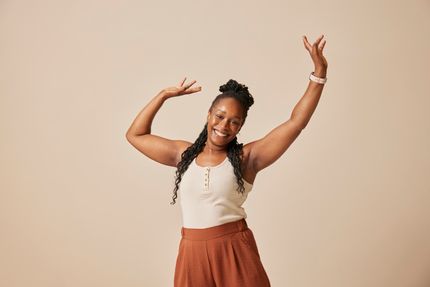

Els (71): “If people had listened to me more at the time, I would have felt less uncertain.”
Els worked in primary education, balancing her part-time job with raising two daughters. When she stopped taking the pill at around 43, she noticed some subtle changes, but nothing was particularly obvious. “I just stopped taking the pill; I didn’t really give it much thought.” Menopause? It was barely mentioned.
“My colleagues would stick their heads out of the window during meetings. Those were, of course, hot flushes. One of the few symptoms that were recognised at the time.”

I mostly heard about hot flushes, but I hardly had any myself

“I was in my early forties and stopped taking the pill, which had a bad reputation in the media at the time. After that, my periods stopped.” She didn’t immediately recognise any other signs. Hot flushes — which everyone seemed to talk about — she barely experienced. “I mainly saw it with colleagues: during meetings, they would suddenly stand by the open window to cool down. That’s when I realised: oh, that’s part of it.”
She never heard anything about it in the media. “I never read anything or saw any information about it anywhere. There was internet, but no platforms like this.” It felt as though it was simply something you had to put up with.
“Only now do I know that my joint problems could also have been linked to the menopause.”
Medical help fell short: “No oneaskedanyfurtherquestions”
During the time she was struggling with joint pain and poor sleep, she moved house several times, which meant she saw a number of different GPs. “I went several times, but none of them ever suggested it could be related to the menopause. They didn’t really ask any follow-up questions either.”
Although one doctor did arrange a bone scan and blood tests at the time, she didn’t feel listened to throughout the process. “Looking back, I regret that. If someone had said, ‘This can be part of it,’ I would have felt less uncertain, and perhaps I would have fewer problems now.”
Within her family and circle of friends, she did feel supported. “I’ve known my friends since antenatal classes — we call ourselves The Tuttenclub. Even then, I could talk to them about it, and that’s still the case. At work, it was different; people would just laugh it off.”
“I often thought: don’t make a fuss, it’s just part of life.”
“I didn’t do muchaboutit, but now I wouldask more questions”
At the time, Els did little about her symptoms. “You just kept going. I didn’t feel like I was allowed to complain. Hardly anything was taken seriously, so you wouldn’t really mention it.” What would have helped her? “Access to information. Like what you’re doing now with SeeMe-nopause. Being able to read that you’re not the only one.”
Looking back now, she feels more understanding. “I regret that I experienced it that way, but I also understand that the knowledge just wasn’t at the level it is today. Still, nowadays I would ask more questions: where do these symptoms come from? And what can I do myself?”
“If I could have read back then what I know now, I would have felt more confident in conversations with the doctor. Perhaps I would have been able to express more clearly what I needed.”
Els’ tip forwomentoday
Els hopes that women today will feel able to make use of all the information and support that is available. “You don’t have to wait for it to pass. And take yourself seriously. Especially when speaking to your gynaecologist. You don’t have to brush it aside or think it’s just something you have to put up with. Asking questions, following things up, seeking information: it makes a difference. And you really do deserve that.”
Tips and advice











